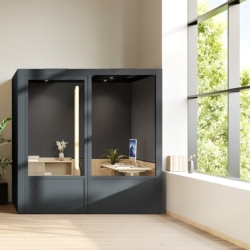December 15, 2025
Search Results for: flexible working
November 13, 2025
Lords Committee calls for clearer policy to address the future of home working
by Neil Franklin • Flexible working, News
 A House of Lords committee has called for a more coherent national approach to remote and hybrid work, warning that unclear responsibilities, inconsistent data, gaps in employer guidance and uneven access to flexible work risk undermining the UK’s ability to adapt to long-term changes in working patterns. According to the report, Is Working From Home Working?, published today (13 November) the rapid rise in home-based working since the pandemic has outpaced the Government’s ability to coordinate policy or collect reliable data. Responsibility for remote work is “split across government departments”, the Committee notes, with implications for employment, transport, digital infrastructure and housing policy. (more…)
A House of Lords committee has called for a more coherent national approach to remote and hybrid work, warning that unclear responsibilities, inconsistent data, gaps in employer guidance and uneven access to flexible work risk undermining the UK’s ability to adapt to long-term changes in working patterns. According to the report, Is Working From Home Working?, published today (13 November) the rapid rise in home-based working since the pandemic has outpaced the Government’s ability to coordinate policy or collect reliable data. Responsibility for remote work is “split across government departments”, the Committee notes, with implications for employment, transport, digital infrastructure and housing policy. (more…)
October 30, 2025
Coworking space numbers rise across UK and Ireland
by Neil Franklin • News, Property
 The number of coworking spaces in the UK and Ireland has reached a new peak, according to new industry data, signalling the continuing shift in how offices are being used. Data from CoworkingCafe’s third quarter 2025 report show around 4,315 coworking locations across the region, of which approximately 4,048 are in the UK and 267 in Ireland. In the UK the distribution is heavily concentrated in major urban centres. Greater London alone hosts roughly 1,191 coworking sites. Manchester follows as a leading regional hub with around 120 spaces, while Glasgow and Birmingham also show significant numbers at 68 and 67 respectively. (more…)
The number of coworking spaces in the UK and Ireland has reached a new peak, according to new industry data, signalling the continuing shift in how offices are being used. Data from CoworkingCafe’s third quarter 2025 report show around 4,315 coworking locations across the region, of which approximately 4,048 are in the UK and 267 in Ireland. In the UK the distribution is heavily concentrated in major urban centres. Greater London alone hosts roughly 1,191 coworking sites. Manchester follows as a leading regional hub with around 120 spaces, while Glasgow and Birmingham also show significant numbers at 68 and 67 respectively. (more…)
September 23, 2025
Hybrid working is now more about when work is done, rather than where
by Neil Franklin • Flexible working, News
![]() A new report from Owl Labs suggests that the debate over where people work is being replaced by questions about when they work. The firm’s 2025 State of Hybrid Work report argues that the defining issue in workplace flexibility and hybrid working is now time rather than location. The study, based on a survey of 2,000 US workers, claims that almost half of respondents believe they do not have enough flexibility in their working hours. Thirty seven percent said they would turn down a job that did not provide flexible scheduling, an increase compared to last year. Around a quarter said they would find a four day week more attractive than a traditional arrangement, with many indicating they would be willing to take a pay cut in exchange for greater control over their time. On average, workers said they would give up around eight to nine percent of their salary to secure more flexible hours or a reduced working week. (more…)
A new report from Owl Labs suggests that the debate over where people work is being replaced by questions about when they work. The firm’s 2025 State of Hybrid Work report argues that the defining issue in workplace flexibility and hybrid working is now time rather than location. The study, based on a survey of 2,000 US workers, claims that almost half of respondents believe they do not have enough flexibility in their working hours. Thirty seven percent said they would turn down a job that did not provide flexible scheduling, an increase compared to last year. Around a quarter said they would find a four day week more attractive than a traditional arrangement, with many indicating they would be willing to take a pay cut in exchange for greater control over their time. On average, workers said they would give up around eight to nine percent of their salary to secure more flexible hours or a reduced working week. (more…)
September 23, 2025
Hybrid working is here to stay. Squawk
by Mark Eltringham • Comment, Technology, Workplace design
 In his recent book, The Constitution of Knowledge, the author Jonathan Rauch argues that knowledge consists of something about which nearly everybody can agree, and which has been arrived at by a structured, ongoing and benign process of debate and discovery. Without this social architecture, things unravel and sometimes in catastrophic ways. The undermining of knowledge and the processes that lead to it has been one of the defining characteristics of authoritarians for the entirety of human history. They know if you can get people to believe absurdities, you can get them to commit atrocities. Or at least shut up and let you get on with the business of despotism. (more…)
In his recent book, The Constitution of Knowledge, the author Jonathan Rauch argues that knowledge consists of something about which nearly everybody can agree, and which has been arrived at by a structured, ongoing and benign process of debate and discovery. Without this social architecture, things unravel and sometimes in catastrophic ways. The undermining of knowledge and the processes that lead to it has been one of the defining characteristics of authoritarians for the entirety of human history. They know if you can get people to believe absurdities, you can get them to commit atrocities. Or at least shut up and let you get on with the business of despotism. (more…)
September 5, 2025
In spite of some headlines, hybrid working is not in decline in the US
by Neil Franklin • Flexible working, News
 Gallup’s latest research on working patterns among remote-capable employees in the United States suggests that hybrid working is proving far more resilient than some headlines about a wholesale return to the office would imply. The data shows that hybrid work remains the dominant arrangement and has not significantly declined, even as political and organisational pressure grows to increase in-person attendance. The survey finds that just over half of employees who can work remotely are now in hybrid arrangements. This represents a slight decline from the previous two quarters, falling from 55 percent to 51 percent. (more…)
Gallup’s latest research on working patterns among remote-capable employees in the United States suggests that hybrid working is proving far more resilient than some headlines about a wholesale return to the office would imply. The data shows that hybrid work remains the dominant arrangement and has not significantly declined, even as political and organisational pressure grows to increase in-person attendance. The survey finds that just over half of employees who can work remotely are now in hybrid arrangements. This represents a slight decline from the previous two quarters, falling from 55 percent to 51 percent. (more…)
August 20, 2025
UK public sector appears to be phasing out remote and hybrid working
by Neil Franklin • Flexible working, News
 A new report suggests the UK public sector is moving sharply away from remote and hybrid working, despite signs that the shift could be undermining recruitment and retention. According to the 2025 State of Digital report by Unit4, just over half of UK public sector organisations now require employees to be fully office-based, compared with only 7 percent in 2023. The proportion operating fully remote models has dropped from 37 percent two years ago to 15 percent, while hybrid arrangements have fallen from 93 percent to 49 percent. (more…)
A new report suggests the UK public sector is moving sharply away from remote and hybrid working, despite signs that the shift could be undermining recruitment and retention. According to the 2025 State of Digital report by Unit4, just over half of UK public sector organisations now require employees to be fully office-based, compared with only 7 percent in 2023. The proportion operating fully remote models has dropped from 37 percent two years ago to 15 percent, while hybrid arrangements have fallen from 93 percent to 49 percent. (more…)
July 4, 2025
Flexible office market in EMEA enters new phase of growth
by Neil Franklin • News, Property
 The flexible office market across Europe, the Middle East and Africa is shifting into a new phase, according to new data from Colliers. The region’s flex workspace footprint grew by more than 348,000 square metres in 2024, despite difficult economic conditions and reduced capital availability. The firm’s Flexpansion: The Architecture of Agility report charts a 4.4 percent year-on-year increase in flexible space across 46 EMEA markets. The total now stands at 8.3 million square metres. (more…)
The flexible office market across Europe, the Middle East and Africa is shifting into a new phase, according to new data from Colliers. The region’s flex workspace footprint grew by more than 348,000 square metres in 2024, despite difficult economic conditions and reduced capital availability. The firm’s Flexpansion: The Architecture of Agility report charts a 4.4 percent year-on-year increase in flexible space across 46 EMEA markets. The total now stands at 8.3 million square metres. (more…)
June 24, 2025
ROOM Launches The Room Collection: flexible architecture for today’s hybrid workplace
by Freddie Steele • Company news, Flexible working, Workplace design
 ROOM, the leading modular architecture company behind the award-winning Phone Booth and pioneer in flexible workplace design, has introduced The Room Collection: a new series of scalable and adaptable rooms, designed to provide privacy in open floorplans and meet the dynamic needs of today’s businesses and office workers. A major pain point for employees is working in an office that hasn’t yet been optimized for the hybrid workplace. Simultaneously, businesses may find it difficult to swiftly adapt to changing workplace needs. While insufficient meeting spaces, poor acoustics and back-to-back virtual meetings plague workers, inflexible leases and hefty construction costs prevent business leaders from adapting accordingly. The Room Collection helps solve this through its easy-to-assemble, soundproof modular office system that can evolve to meet the needs of businesses at any stage. (more…)
ROOM, the leading modular architecture company behind the award-winning Phone Booth and pioneer in flexible workplace design, has introduced The Room Collection: a new series of scalable and adaptable rooms, designed to provide privacy in open floorplans and meet the dynamic needs of today’s businesses and office workers. A major pain point for employees is working in an office that hasn’t yet been optimized for the hybrid workplace. Simultaneously, businesses may find it difficult to swiftly adapt to changing workplace needs. While insufficient meeting spaces, poor acoustics and back-to-back virtual meetings plague workers, inflexible leases and hefty construction costs prevent business leaders from adapting accordingly. The Room Collection helps solve this through its easy-to-assemble, soundproof modular office system that can evolve to meet the needs of businesses at any stage. (more…)
June 18, 2025
At home down under: hybrid working has become a way of life in Australia
by Marvin Gort • Flexible working, News, Wellbeing
 The majority of Australian employees now work from home at least part of the week, with hybrid working becoming embedded in organisational culture, according to a new report from the University of Melbourne and Western Sydney University. The study, Navigating the Future of Working from Home in Australia, is based on survey data collected in late 2023 and charts how working patterns have changed in the years following the pandemic. It suggests that while fully remote work remains uncommon, most employees now work from home one to three days per week and expect that flexibility to continue. (more…)
The majority of Australian employees now work from home at least part of the week, with hybrid working becoming embedded in organisational culture, according to a new report from the University of Melbourne and Western Sydney University. The study, Navigating the Future of Working from Home in Australia, is based on survey data collected in late 2023 and charts how working patterns have changed in the years following the pandemic. It suggests that while fully remote work remains uncommon, most employees now work from home one to three days per week and expect that flexibility to continue. (more…)
June 12, 2025
Turns out that hybrid working is indeed the new normal. For a minority of people
by Neil Franklin • Flexible working, News
 A new analysis from the Office for National Statistics confirms that hybrid working is now the dominant form of flexible work for many people in Great Britain. The figures, which cover the period from January to March 2025, show that 28 percent of working adults now combine home and on-site work on a regular basis – the highest proportion recorded since the ONS began monitoring hybrid working patterns. This compares with just 9 percent who work exclusively from home and around 55 percent who are permanently based at a single workplace. The remaining proportion are made up of those with no fixed place of work or whose work locations vary, such as mobile or site-based roles.
A new analysis from the Office for National Statistics confirms that hybrid working is now the dominant form of flexible work for many people in Great Britain. The figures, which cover the period from January to March 2025, show that 28 percent of working adults now combine home and on-site work on a regular basis – the highest proportion recorded since the ONS began monitoring hybrid working patterns. This compares with just 9 percent who work exclusively from home and around 55 percent who are permanently based at a single workplace. The remaining proportion are made up of those with no fixed place of work or whose work locations vary, such as mobile or site-based roles.
(more…)

























October 8, 2025
The real reason why your workplace strategy isn’t working
by Jennifer Bryan • Comment, JB, Workplace